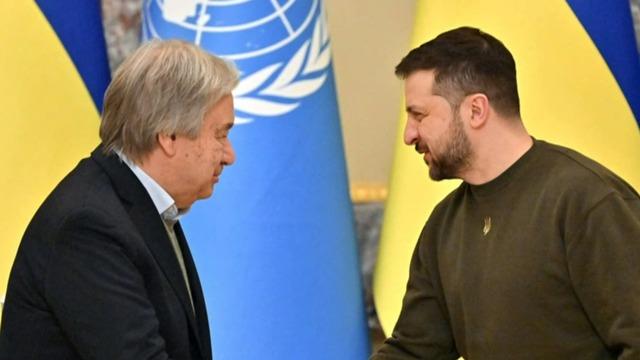▶ Watch Video: U.N. Secretary-General Antonio Guterres visits Ukraine
United Nations — Russia’s top diplomat said Thursday that it would be “quite complicated” for Moscow to sign onto a renewal of the deal struck between his country and Ukraine last year that has allowed for the export of grain from both countries, easing a global food crisis. A day after U.N. Secretary-General Antonio Guterres visited Kyiv in a bid to shore up support for the Black Sea Grain Initiative, Russian Foreign Minister Sergey Lavrov amplified long-standing complaints from Moscow that the deal was being “half fulfilled,” claiming Western sanctions were blocking the export of Russian fertilizers covered under the agreement.
“If the package is half fulfilled, then the issue of extension becomes quite complicated,” Lavrov said at a news conference in Moscow.
The agreement, negotiated and implemented by the U.N. and Turkey, must be renewed by March 18, but there has been mounting concern that Russia may decline to keep it going.
“Our Western colleagues, the United States and the European Union, pathetically declare… that no sanctions apply to food and fertilizers, but this position is dishonest,” Lavrov said.
After meeting President Volodymyr Zelenskyy in Kyiv on Wednesday morning, Guterres thanked Zelenksyy for welcoming him “in such difficult circumstances,” and said it was important to “underscore the critical importance of the rollover of the Black Sea Grain Initiative.”
Representatives from the U.N. and Turkey have been meeting to try to keep the grain exports flowing. The Grain Initiative was signed in July 2022 in an urgent bid to free up some 20 million tons of grain that were stuck at the time in silos, ships and other storage facilities amid Russia’s attack on Ukraine.
With Ukraine’s ports blocked and sanctions preventing the export of some Russian grains and fertilizer, global food prices soared, putting humanitarian aid efforts around the world at particular risk. CBS News met starving mothers and aid workers in South Sudan who said Russia’s blockade of Ukrainian ports was exacerbating one of the worst humanitarian crises on the planet.
The U.N. has called the deal vital for helping “to cushion the suffering that this global cost-of-living crisis is inflicting on billions of people.”
According to the Joint Coordination Center in Turkey, which manages the shipping lanes and cargo inspections under the auspices of the agreement, some 23 million tons of grains have been exported since it came into effect.
The deal also aimed to facilitate the export of Russian food and fertilizers, but Moscow has long complained that those shipments have been disrupted by U.S. and European sanctions. Russian officials said as recently as November that they would renew the pact, but the intense fighting still raging in Ukraine had put the extension in question, and Lavrov’s latest remarks were sure to heighten concerns over its renewal.
Although food exports have not been placed under global sanctions, Moscow claims restrictions on banking and insurance companies have stalled the export of thousands of tons of Russian fertilizer.
The agreement reached in July has been hugely important to Guterres, who personally helped negotiate its terms. In his statement on Wednesday, the U.N. chief said that until a “just peace can be secured” in Ukraine, he and the U.N. would “continue working hard to mitigate the impacts of the conflict which has caused enormous suffering for the Ukrainian people — with profound global implications.”
He said the grain deal had “contributed to lowering the global cost of food and has offered critical relief to people, who are also paying a high price for this war, particularly in the developing world.”
The U.N. chief said previously that the four parties to the deal — Ukraine, Russia, the U.N. and Turkey — were “working hard to remove all the remaining obstacles…. to facilitate exports of Russian food and fertilizers to global markets.”
Both Kyiv and Moscow have reestablished their grain exports under the agreement, easing global food prices. Bloomberg reported last week that Russian grain exports were booming and that shipments of wheat had almost doubled over the past year.
There were early warning signs last week that Russia could decline to renew the agreement when Lavrov, during a G-20 summit in India, accused the U.S. and Europe of “shamelessly burying” the pact.
U.S. Secretary of State Antony Blinken accused Russia at that meeting of “deliberately and systematically” slowing the export of Ukrainian grain shipments.




































